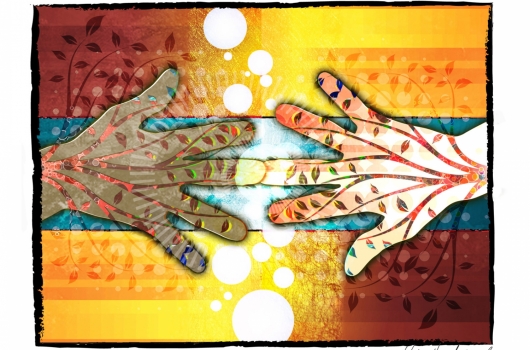Our Actions and Inactions Always Have Consequences

“Con tu mano y la mía.” (With your hand and my hand.) Digital Art by: Héctor J. Hernández
Since 2009, I have been working and walking with many Hispanic immigrant communities, mostly from the west side of the city of Indianapolis. I have served as a Marriage and Family Therapist and most recently as a solo pastor of Iglesia Nueva Creación (New Creation Church) in the town of Speedway, IN. As I serve and walk in acompañamiento (accompaniment) with my brothers and sisters from Latin America, I have witnessed firsthand the beauty, richness, resiliency, resourcefulness, and creativity that allow these communities to move forward and thrive. However, I have also witnessed their struggles, pains, and sorrows as they try to survive through multiple and complex oppressive systems that discriminate, marginalize, victimize, and dehumanize them, vehemently conspiring against their well-being.
As immigrant Hispanic families try to navigate these systems and try to survive the clutches of systemic racism, oppression, and dehumanization, they also deal with the by-product of this struggle. And, it often comes to their lives as mental health stressors like anxiety, anger, depression, post-traumatic stress, and as maladaptive behaviors like domestic violence and addictions, to name a few. Paulo Freire once said “dehumanization engenders violence,” and the more I walk within these communities, the more I see the effect that mental health issues, incarnated as violence, have in the lives of the most vulnerable: women and children.
Even when this is a very real, constant, and painful reality for many Latin American immigrants in this country, like Isaiah I declare that God is doing a new thing! (Isaiah 43:19) Last year, Iglesia Nueva Creación formed a partnership with the Marion County Public Health Department program called Healthy Start. This partnership has allowed me and my wife to provide workshops for couples and families focused on mental health. It has also allowed our church to reach out to Hispanic young couples who are dealing with the challenges of becoming parents and struggling financially.
We are also collaborating with the Center for Interfaith Cooperation and AmeriCorps IRSC (Immigrant Refugee Service Corps) to develop a “Faith Health Initiative” pilot program. The goal would be to connect the various immigrant communities with available healthcare services (including mental health) in partnership with communities of faith. My ultimate goal is to create a space in which faith and clinical mental health counseling in Spanish could be provided for these immigrant communities. We are certainly not there yet, but we are actively looking for ways to make it a reality, because the need is overwhelming. After all, “the message of the Good News is of the liberation of human beings from everything and everyone that keeps them enslaved” (Elsa Tamez).
As people of faith, and as people of privilege, let us never forget the connection between access to affordable mental health services and social justice. Our actions and inactions always have consequences, and the most vulnerable, “the least of these,” are the ones neglected who suffer. Let us continue to pray and work together for whole and healthy immigrant communities.
Questions to Consider:
- How do you think mental health issues end up being a by-product of systemic oppression? How have you seen this in your community or own personal experience? As Christians, how are our actions and/or inactions connected to systemic oppression?
- In what ways has the church typically responded to the maladaptive behaviors associated with mental health issues?
- Considering the fresh perspective Rev. Hernández provides on mental health being a by-product of systemic oppression, what are some new ways in which the church can respond to maladaptive behaviors associated with mental health issues?
- In what ways do race, class, ethnicity, language, privilege, wealth, and national affiliation play into our own perception of what is a legitimate mental health symptom and what is not? How does our understanding of Jesus, hope, grace, justice, sin, pride, and love influence our perceptions?
Print-friendly version here! >>
Rev. Héctor J. Hernández has been serving the Latino/Latina immigrant community of Indianapolis since 2009. He is an ordained minister of the Christian Church (Disciples of Christ) who is serving as interim pastor of Iglesia Presbiteriana Nueva Creación (New Creation Presbyterian Church) in the west side of Indianapolis. Hector has a Master in Divinity and a Master of Arts in Marriage and Family Therapy from the Christian Theological Seminary, and an undergraduate degree in Communications with a minor in Visual Arts.
Hernández is a guest blogger for the NBA Mental Health and Congregational Care Affinity Group Research and Design Team. This team has worked to define the purpose and goals of a full Affinity Group to launch in early 2016. This effort is in response to the passing of GA-1523 “Becoming a People of Welcome and Support to People with Mental Illness and/or Mental Health Issues” by the 2015 General Assembly of the Christian Church (Disciples of Christ). For more information, please email Rev. Monica Wedlock Kilpatrick, Director of Disciples Care Exchange and Affinity Group Ministries, at mkilpatrick@nbacares.org.